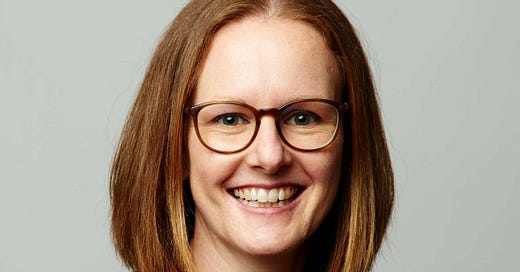Claire Thomas on advocating for new parents, the future of data for DEI and dismantling the idea that creating inclusion is extra work.
Claire Thomas is the Chief Diversity & Inclusion Officer at Hitachi Vantara, responsible for diversity, equity and inclusion (DEI) programs that reflect the backgrounds and interests of the company’s workforce. Prior to taking on this role, Claire spent 10 years in technology sales at Hitachi and five years at Microsoft. She is committed to improving DEI within the technology sector and champions technical and non-technical career paths as well as new parents returning from leave.
Dinal: In change management, there is a 20-60-20 rule which says that 20% of people will be on board with your change, 60% could be persuaded either way and the remaining 20% will be strongly opposed. In your role as Chief Diversity Officer, how do you influence the 60% to advance DEI?
Claire: We all know the famous McKinsey studies showing that diversity is good for business. In addition, investors are looking for proof that companies are taking DEI seriously as part of the ESG agenda, customer expectations are increasing and candidates are choosing companies based on visible commitments in this space.
Yet it can be hard to relate to these overarching themes as an individual contributor or manager in an organisation, so I spend time with people to help them understand what’s in it for them. Whether that’s helping them uncover a personal connection to a community, sharing lived experiences to highlight that not everybody experiences the workplace the same way, or sharing how this will help with retention and employee performance to make them a great leader – everyone needs a reason to spend the time and effort thinking about how to incorporate DEI into their roles.
“DEI is not extra work. It’s the work of a great leader.”
Overcoming the concern that this is ‘extra’ work is also critical. Being inclusive is not extra work, it’s everyday work. Perhaps you need to wait slightly longer to get a range of candidates in a shortlist, or to invest in personal development so that your promotion pipeline is more diverse, but this is not extra work. It’s the work of a great leader.
Dinal: As a passionate advocate for working parents, can you share an example of a program, practice or policy that you've seen be particularly impactful in the workplace and why?
Claire: I’ve heard great stats on uptake when companies offer extended paid paternity leave or equal parental leave regardless of gender or how they became parents, without linking these policies to the UK Shared Parental Leave scheme which has very low uptake. I’m a founding member of the amazing charity Pregnant Then Screwed, and they are actively campaigning for paternity leave to be extended to 6 weeks at 90% pay, with the Liberal Democrats just announcing this under their Better Start to Life campaign. They also campaign for more investment in childcare, support for working mothers and ending the Motherhood Penalty.
Many men and non-birthing partners want to be more active parents, and many mothers want more support from their partners in order to return to work. I’m a strong believer that equality starts at home. If we continue to have a huge imbalance between who takes on caring responsibilities and does the unpaid work in the home, we’ll continue to see that imbalance in the workplace, especially at leadership levels. So many parents want to have a successful career and be a present parent. I don’t think the two should be mutually exclusive. As organisations, we have a role to play to create cultures and ways of working that allow the two to coexist.
Dinal: What are your thoughts on the leveraging data for DEI and how do you see this evolving in the future?
Claire: I think data is critical for DEI. Many leaders rely heavily on data to inform their decision making, and so without it in DEI, in can be hard to make a case for investment, focus and energy. I also think it’s really complicated, as the data you can capture about employees and their experience varies country to country, as does people’s willingness to share data voluntarily.
There needs to be a significant level of trust to self-disclose and a clear understanding of what will be done with the data, how sharing will benefit the individual, as well as the organisation. Organisations can explore anonymous data capture as a way to understand overall company demographics and employee experience in different communities as an alternative to self-identification. In future, I’d expect we have more channels to collect data and we’ll see increased use of smart technologies for employee listening, feedback and capturing sentiment.
“DEI work is prioritized when people feel a deep connection to it and have a personal why”
We can’t over rely on data though, as humans make so many decisions based on feelings, and we can all look for data to back up our own position. Having people feel a deep connection to DEI work needs an understanding of a personal why that means the work is prioritized, even when other business priorities like revenue need attention. When people have a personal connection, they find ways to integrate DEI work into their day to day work, inclusion is always a priority and people speak up more when things needs to be said out loud. Helping people uncover their why through storytelling and sharing lived experiences of others should be a top priority for DEI practitioners to drive the progress we all want to see in this space.





